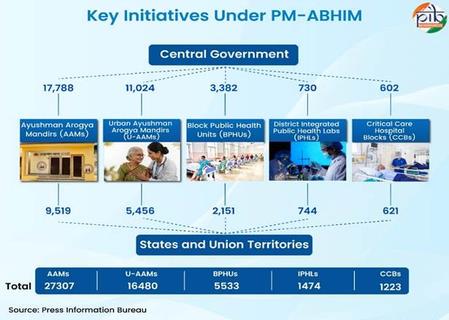
PM-ABHIM Enhanced India's Health Surveillance Systems To Boost Fight Against Pandemics: Govt
The PM-ABHIM programme was launched on October 25, 2021, during the global wave of Covid-19 infections.
With an investment of Rs 64,180 crore over the period 2021-26, the programme aimed to address gaps in infrastructure in health, research, and surveillance in the country.
“Four years after its launch, PM-ABHIM has transformed India's health infrastructure, investing Rs 64,180 crore to strengthen pandemic preparedness and emergency response capabilities,” the government said in an official statement.
“By upgrading facilities from primary to tertiary care levels and enhancing surveillance systems, the scheme has built a more resilient healthcare system,” it added.
PM-ABHIM prioritises pandemic and disaster preparedness by expanding an IT-enabled, real-time disease surveillance network that integrates laboratories at block, district, regional, and national levels to detect, investigate, and prevent outbreaks effectively.
In addition, it promotes health research and innovation, particularly on Covid and other infectious diseases, by advancing the One Health approach, which recognises the interdependence of human, animal, and environmental health.
Key initiatives under PM-ABHIM's Centrally Sponsored Scheme (CSS) component include the approval of 17,788 building-less Sub-Health Centres for upgradation into Ayushman Arogya Mandirs (AAMs), and 11,024 Urban AAMs (U-AAMs) to extend primary healthcare in slum and underserved urban areas.
In addition, 3,382 Block Public Health Units (BPHUs) are being established to bolster block-level health administration and service delivery, while 730 Integrated Public Health Laboratories (IPHLs) are being developed, one in each district, to enhance diagnostic and surveillance capabilities.
Further, to strengthen tertiary care, 602 Critical Care Hospital Blocks (CCBs) are being set up in districts with populations exceeding five lakh.
Overall, administrative approvals worth Rs 32,928.82 crore have been accorded to States and Union Territories for these initiatives, covering 9,519 AAMs, 5,456 U-AAMs, 2,151 BPHUs, 744 IPHLs, and 621 CCBs.
"These efforts mark a major step toward building a resilient, decentralised, and accessible public health network capable of delivering timely and quality healthcare across the country," the government said.

Legal Disclaimer:
MENAFN provides the
information “as is” without warranty of any kind. We do not accept
any responsibility or liability for the accuracy, content, images,
videos, licenses, completeness, legality, or reliability of the information
contained in this article. If you have any complaints or copyright
issues related to this article, kindly contact the provider above.

















Comments
No comment